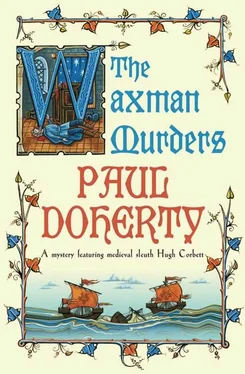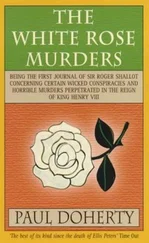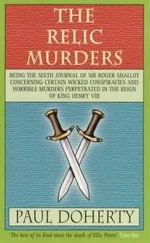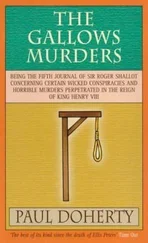Paul Doherty - The Waxman Murders
Здесь есть возможность читать онлайн «Paul Doherty - The Waxman Murders» весь текст электронной книги совершенно бесплатно (целиком полную версию без сокращений). В некоторых случаях можно слушать аудио, скачать через торрент в формате fb2 и присутствует краткое содержание. Год выпуска: 0101, Жанр: Исторический детектив, на английском языке. Описание произведения, (предисловие) а так же отзывы посетителей доступны на портале библиотеки ЛибКат.
- Название:The Waxman Murders
- Автор:
- Жанр:
- Год:0101
- ISBN:нет данных
- Рейтинг книги:3 / 5. Голосов: 1
-
Избранное:Добавить в избранное
- Отзывы:
-
Ваша оценка:
- 60
- 1
- 2
- 3
- 4
- 5
The Waxman Murders: краткое содержание, описание и аннотация
Предлагаем к чтению аннотацию, описание, краткое содержание или предисловие (зависит от того, что написал сам автор книги «The Waxman Murders»). Если вы не нашли необходимую информацию о книге — напишите в комментариях, мы постараемся отыскать её.
The Waxman Murders — читать онлайн бесплатно полную книгу (весь текст) целиком
Ниже представлен текст книги, разбитый по страницам. Система сохранения места последней прочитанной страницы, позволяет с удобством читать онлайн бесплатно книгу «The Waxman Murders», без необходимости каждый раз заново искать на чём Вы остановились. Поставьте закладку, и сможете в любой момент перейти на страницу, на которой закончили чтение.
Интервал:
Закладка:
‘Are you saying she was meeting someone else?’ Corbett asked.
‘I’m saying nothing, Sir Hugh. I merely report what I’ve heard.’
Corbett thanked him and asked him also to be present on the morrow between eleven and noon at Sweetmead Manor. Parson Warfeld agreed, bowed to both of them and left.
‘Ah well.’ Castledene walked towards the door, closed it and leaned against it. ‘Sir Hugh, what can be done here? Lady Adelicia must face the charges levelled against her, whilst this business at Maubisson. . I have,’ he added hastily, ‘despite the snow, sent couriers to all ports asking for harbour-masters and port-reeves to search for Servinus. He must be the assassin!’
Corbett shrugged. ‘I cannot comment on that, Sir Walter. I have my doubts. Why should Servinus wait to come to a foreign country to strike? At a closely guarded manor like Maubisson, in the depths of winter, in a strange city? How did he do it without resistance from his victims? How did he escape?’ He shook his head. ‘All I know is that the matters before us are as dark and bleak as the weather outside. We stand on the edge of a tangled forest of evil deeds, full of danger; we must thread our way carefully through it.’
Chapter 6
Dies irae et vindicatae.
A day of wrath and vengeance.
ColumbaA short while later, Corbett and Ranulf mounted their horses, cloaks pulled tightly about them, and left the Guildhall. They made their way up the Mercery, turning right towards the corner leading to the Butter Cross, then along Burgate, which would take them to Queningate. Darkness was closing in. The air was still bitterly cold, the ground slippery as the ice hardened, yet the stalls and shops were very busy. The narrow, dirt-filled streets were illuminated by flaring torches, the light pouring through tavern and alehouse doors and windows. The shifting murk, the din, clamour and foul smells reminded Corbett of a wall painting in a church depicting the streets of hell. The rakers and scavengers were out with their dung and refuse carts. Pilgrims in their worsted cloaks, displaying pewter badges depicting the martyred head of Becket or the ampulae or miniature flasks representing the martyr’s blood, battled to make their way to and from the cathedral. They screamed abuse at the apprentice boys who darted from the stalls like grey-hounds to pluck at sleeves and cloaks, shouting their goods, inviting passers-by to inspect ‘ninepins for sale all in a row’, ‘boots of Cordovan leather’, ‘candles white and pure as a virgin’, ‘hot pies’, ‘spiced sausages’, ‘sharp knives’.
Tavern hawkers and idlers were encouraging two drunken women to fight; each would hold a penny in her hand, and the first to drop it would be judged the loser and dipped in the freezing water of a nearby horse-trough. A city serjeant fighting to control a loose donkey tried to intervene, whilst bawling for the market bailiffs with their metal-tipped staves to assist him. A chanteur stood on a plinth at the corner of an alleyway off the Mercery; he was telling a group of gaping pilgrims to pray most urgently and earnestly before Becket’s shrine: ‘Because,’ he declared, ‘the time of doom is fast approaching.’ The chanteur informed the pilgrims how he had recently returned from Paris, where a friend had invoked demons to advance him in his studies. On his deathbed, just in time, this friend had been persuaded to repent; as his fellow scholars assembled to sing the funeral psalms around his bier, the man fell into a deep sleep. He dreamed his soul plunged into a dark, sulphurous valley where a gang of fiends tossed his soul about, whilst others prodded him with claws which surpassed the sharpness of any earthly steel. When the man eventually woke up, he vowed to change his life, went on pilgrimage to Becket’s shrine and received God’s calling to enter the Benedictine order. So, the chanteur concluded, they too must pray most earnestly to save themselves from the traps and lures of Satan.
Corbett half listened to this man, clamorous as a sparrowhawk, as he waited for the street to clear before him. At last they moved on and reached the centre of Canterbury, with its great Buttery Cross soaring above the stalls and booths. On the top step a Crutched Friar was delivering the sentence of excommunication against a felon who had dared to rob his church.
‘I curse him by the authority of the Court of Rome, within or without, sleeping or waking, going or sitting, standing and riding, lying above the earth and under earth, speaking, crying and drinking; in wood, water, field and town. I curse him by Father, Son and Holy Spirit. I curse him by the angels, archangels and all the nine orders of heaven. I curse him by the patriarchs, prophets and apostles. .’ On a lower step, totally ignoring the friar, a relic-seller pointed to his leather chest, claiming it contained the stone where Christ’s blood was spilt, a splinter from the Lord’s cradle, a certain crystal vessel bearing shards of the stone tablet on which God had inscribed the law for Moses, straps from Jesus’ winding sheets and fragments from Aaron’s robe. A gang of burly apprentice boys standing around him demanded that the miraculous chest be opened to show them such wonders. The relic-seller refused and a brawl ensued. Market bailiffs and beadles were busy at the stocks, locking in foists, roisterers and drunkards alongside breakers of the King’s peace or the market regulations. A deafening clamour of noise dinned the ear. Corbett looked up at the great mass of Canterbury Cathedral rearing above him, black against the darkening sky. He cursed quietly, and Ranulf, riding slightly behind him, leaned forward.
‘Master, what is it?’
‘I still have the King’s special task to do,’ Corbett murmured, his words almost lost beneath the noise of the market. ‘Perhaps tomorrow.’
Eventually they had to dismount and lead their horses. The ground underfoot was thick and mushy, dung and mud mixing with the refuse thrown from the stalls and taverns. A moonman pushed his way through, wheeling a barrow with a small bear chained to it. Corbett wondered idly where he was going, only to be distracted by a loud-mouthed apothecary who plucked his sleeve, claiming he had an electuary distilled from silver which would cure all ills. Corbett shrugged him off as he glimpsed a goldsmith’s sign. He told Ranulf to hold the horses and walked over. He wanted to divert himself for a while, and was resolved to buy something unique for Lady Maeve.
The merchant behind the stall quickly appraised Corbett from head to toe and immediately led him into the back room of his shop, where he took down an iron-bound coffer locked with three clasps. He opened this and showed Corbett an array of diamonds, pearls, emeralds and sapphires which he called by fancy names such as ‘Bon Homme’, ‘The Dimple’, ‘The Barley-corn’, ‘The Distaff’, ‘The Cloud’, ‘The Quail’, ‘The Chestnut’, ‘The Ruby King’. Corbett studied each one, promised the man he would return and left the shop.
Rejoining Ranulf, Corbett grasped the reins of his horse and they walked on. Ranulf realised that any attempt at conversation would be futile, whilst he himself was eager to drink in the various sights of the city, catch a pretty eye or win a smile from some lovely face. At last they were clear of the main trading area. The bells of the city began to clang out the tocsin, the sign for the market to close and all good citizens to return to their homes. They passed the churches of St Mary Magdalene and St Michael, then turned left, following the route they’d taken into the city, along the old boundary wall through Queningate and out into the countryside. Once mounted, Ranulf spurred alongside Corbett to question him about what happened at the Guildhall, but he received little satisfaction.
Читать дальшеИнтервал:
Закладка:
Похожие книги на «The Waxman Murders»
Представляем Вашему вниманию похожие книги на «The Waxman Murders» списком для выбора. Мы отобрали схожую по названию и смыслу литературу в надежде предоставить читателям больше вариантов отыскать новые, интересные, ещё непрочитанные произведения.
Обсуждение, отзывы о книге «The Waxman Murders» и просто собственные мнения читателей. Оставьте ваши комментарии, напишите, что Вы думаете о произведении, его смысле или главных героях. Укажите что конкретно понравилось, а что нет, и почему Вы так считаете.












